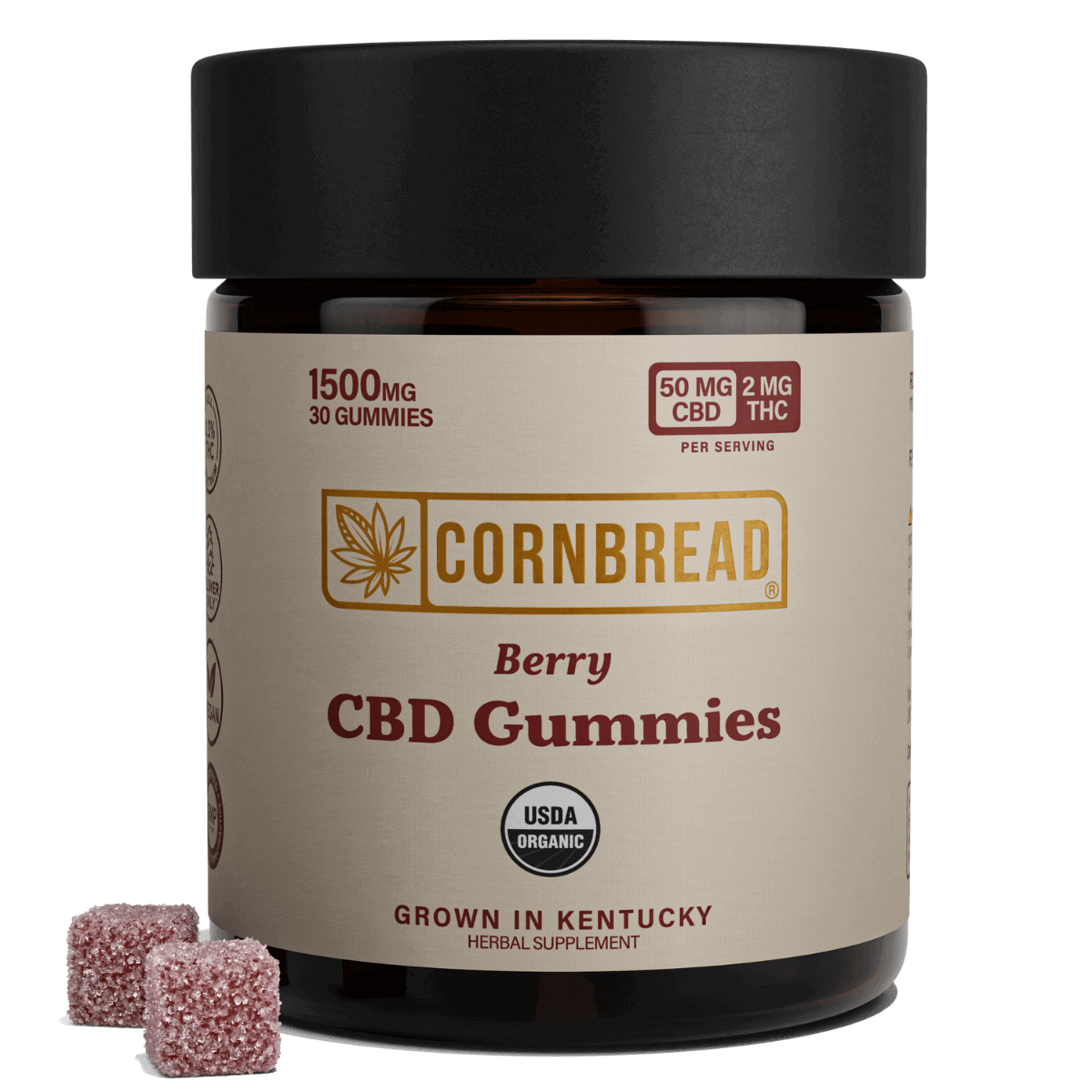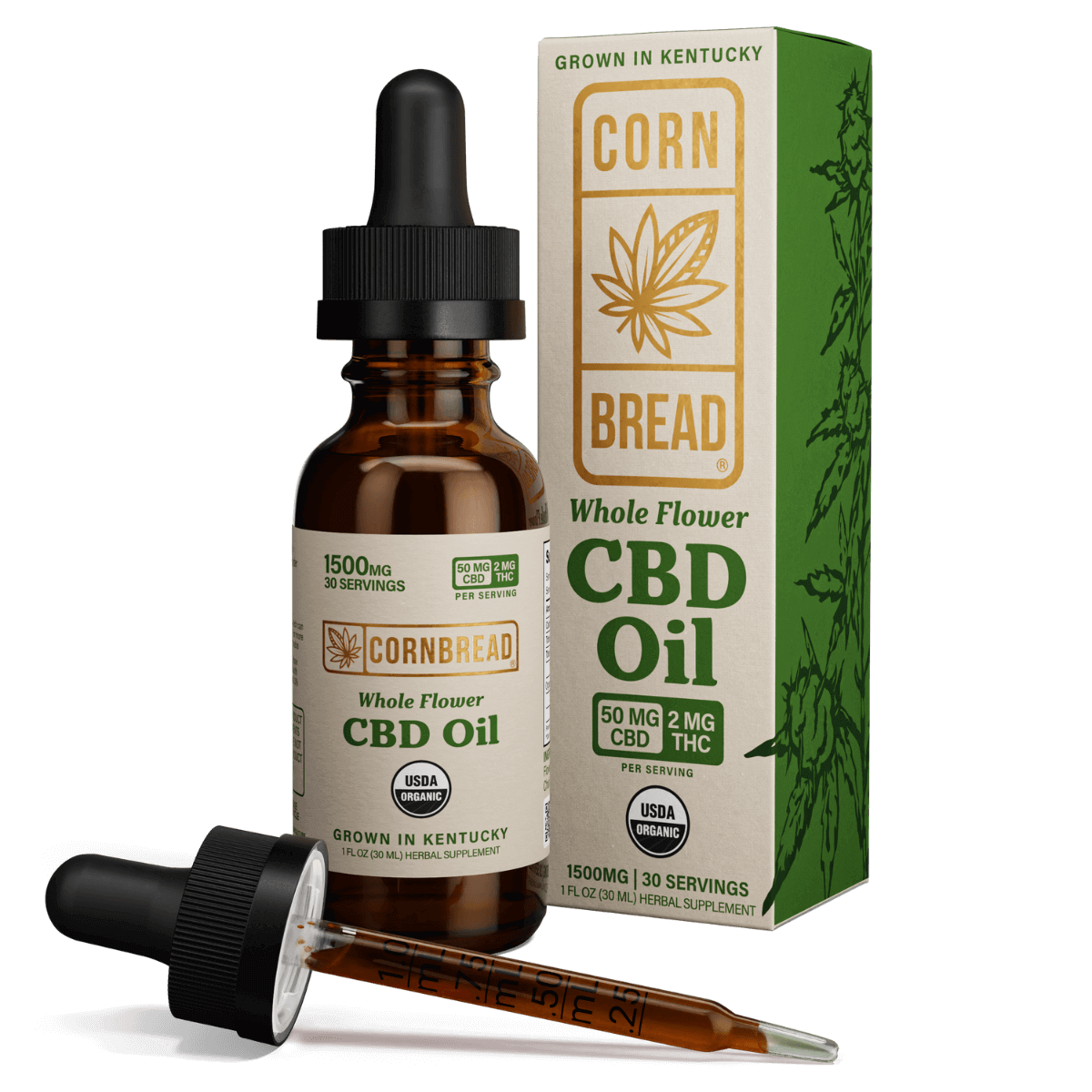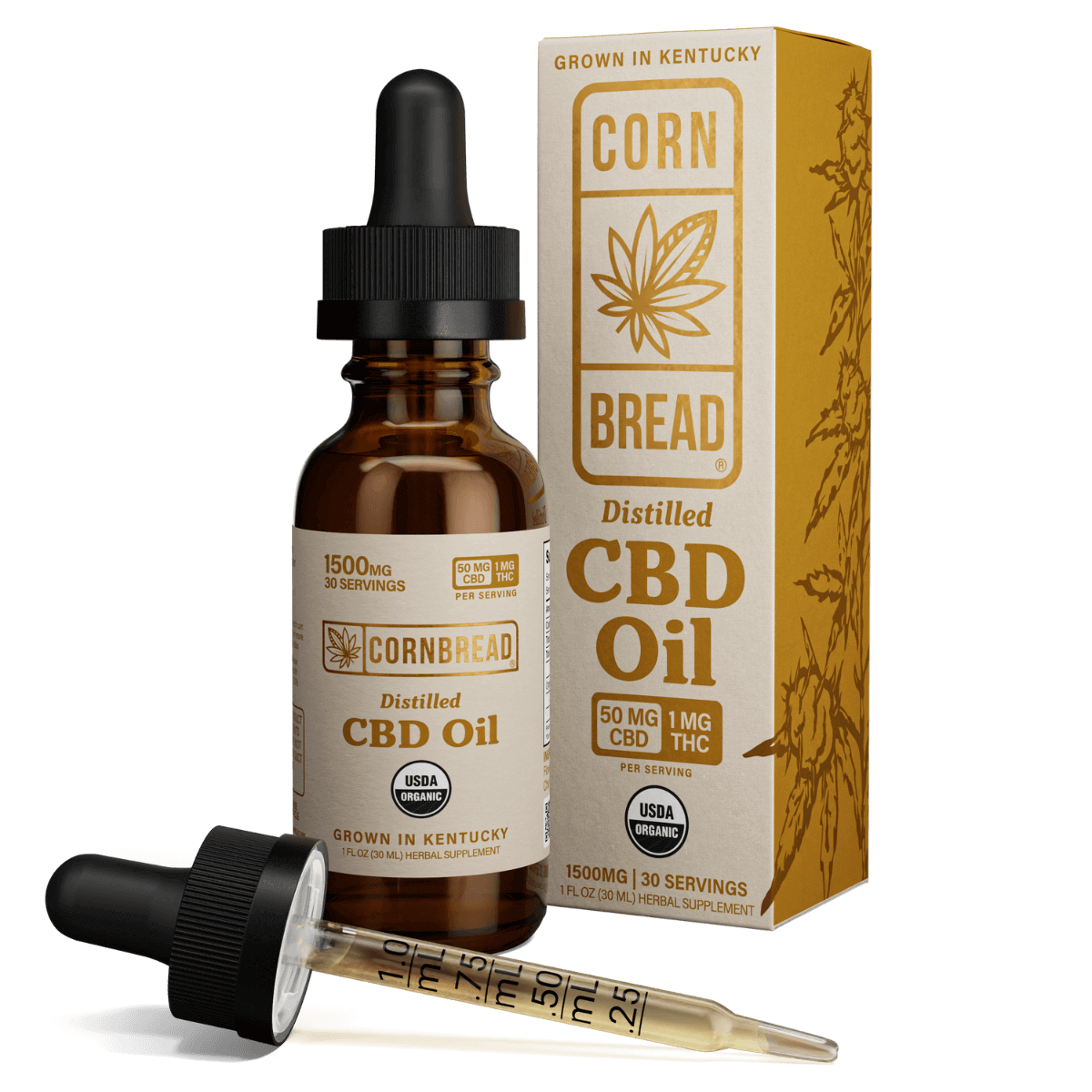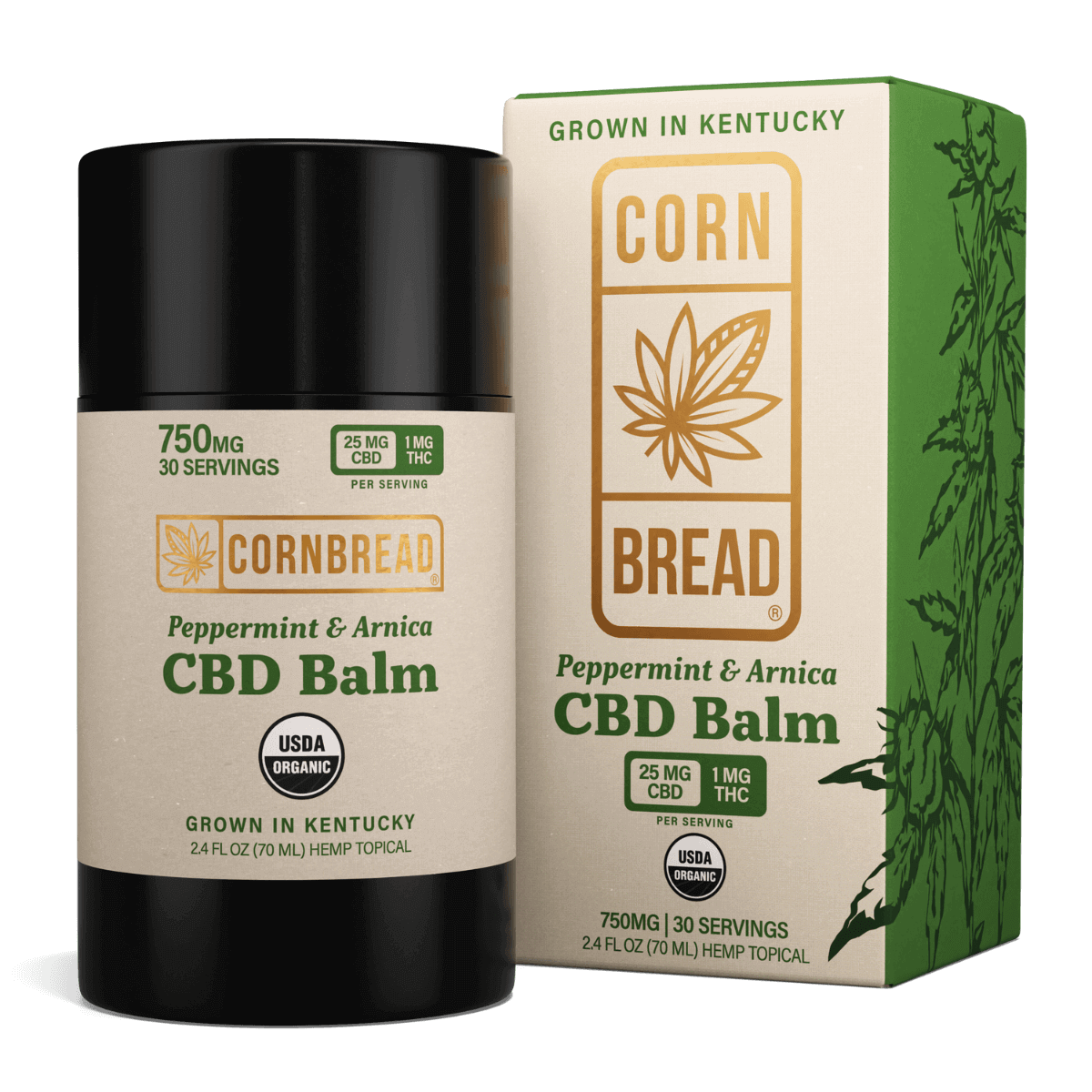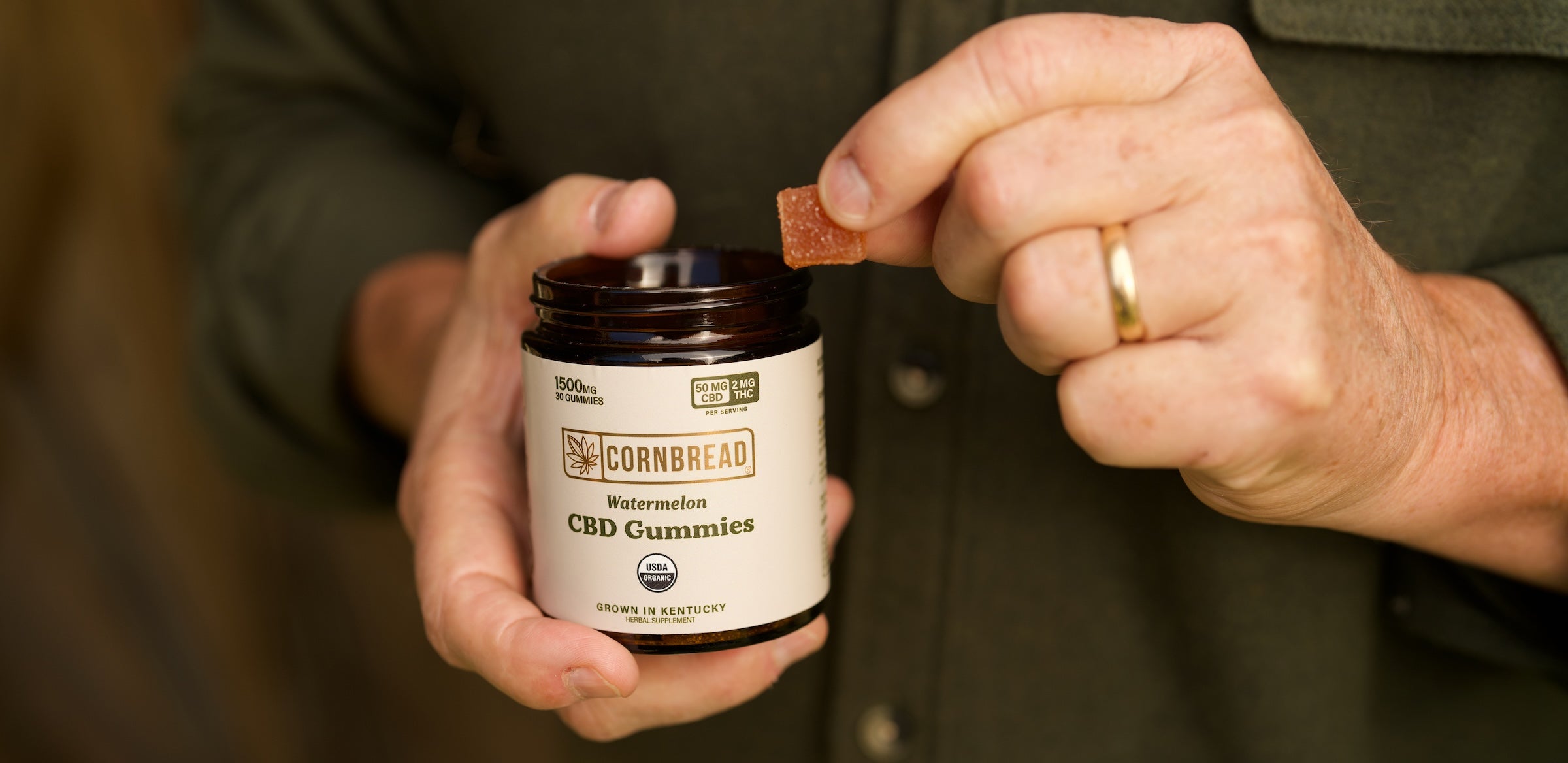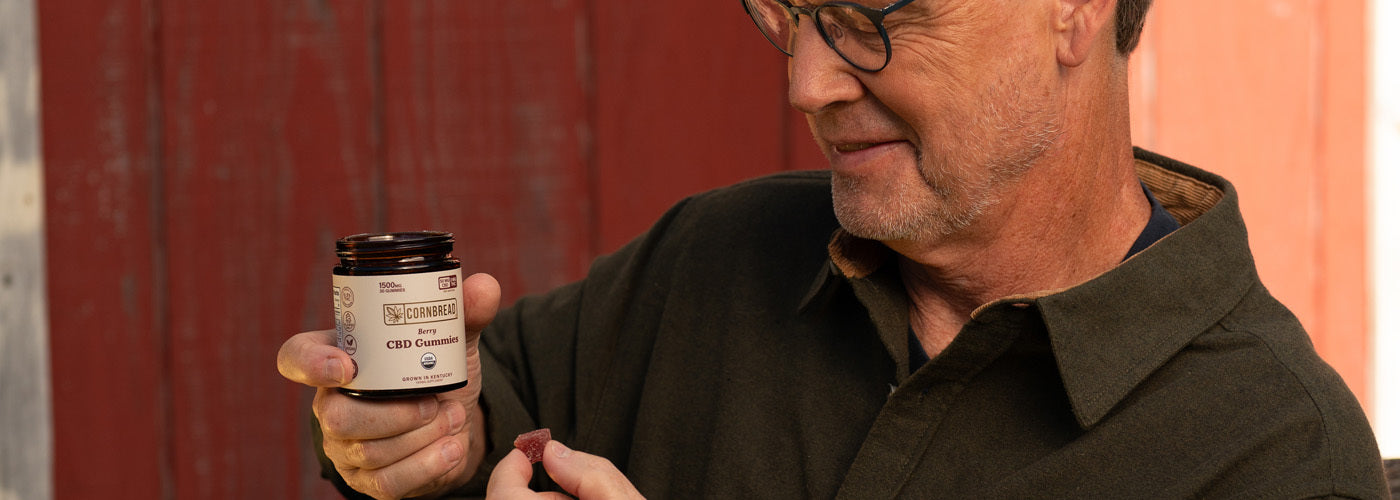Table of Contents
- Introduction
- CBD and the Other Cannabinoids
- How Does CBD Work Inside the Body?
- Marijuana vs. CBD
- So, How Long Does It Take for CBD To Work?
- What Can Impact the Time It Takes for CBD To Work?
- How Much CBD Should I Take To Start?
- Taking CBD Oil: Finding Your Sweet Spot
- What Kind of CBD Should I Take?
- Finding the Highest Quality CBD Oil
- Full Spectrum CBD From Cornbread Hemp
Introduction
Waiting for CBD to work its magic? Whether you’re looking to bring about relief from stress, aches and pains, or occasional sleeplessness, you’re on the right track by trying a CBD, or cannabidiol, supplement.
But how long does it take for CBD to work exactly? In short, the answer isn't the same for everyone. In order to determine what you can personally expect from CBD, it's important to first understand more about what CBD is and how CBD works within the body.
CBD and the Other Cannabinoids
CBD is a natural compound found in both hemp and marijuana (varieties of the cannabis sativa plant). There are over 100 different special cannabis compounds in cannabis sativa. They're called cannabinoids and the two most prevalent are CBD and THC (tetrahydrocannabinol).
Hemp and marijuana are extremely similar in appearance and aroma. The key difference is how much THC each plant contains. If a cannabis plant has less than 0.3% THC, it's hemp. If it contains more than 0.3%, it's marijuana.
Cannabinoids aren't the only special compounds found in cannabis plants. Other key players are the terpenes and flavonoids — molecules that give cannabis its color, aroma, and flavor.
How Does CBD Work Inside the Body?
There's a reason cannabinoids have the potential to produce such a wide range of therapeutic benefits when consumed. And that reason is the "endocannabinoid system" — ECS for short.
"Endo-" comes from Greek and means "inside" or "within." An endocannabinoid is what we call a cannabinoid produced inside the body. (That's right! You can make your own cannabinoids.)
The endocannabinoid system is a complex network of endocannabinoids, cannabinoid receptors, and enzymes (which break down cannabinoids), and it's located all throughout the body. While there's still a lot to learn about how exactly the ECS works, research suggests that it plays an important role in regulating many important functions like mood, sleep, appetite, and pain response.
Endocannabinoids interact with ECS receptors by binding to them and stimulating specific responses as a result. Because cannabinoids from cannabis (also called phytocannabinoids) are very similar to endocannabinoids, they're also able to interact with these receptors and bring about positive effects.
Most cannabinoids bind with ECS receptors — like THC, which primarily binds with receptors in the brain, bringing about a "high" feeling. However, CBD interacts differently with the ECS. Instead of binding with receptors, CBD inhibits the action of ECS enzymes, preventing them from breaking down cannabinoids (endo- and phyto-). This allows those cannabinoids to produce even greater effects on the body's systems, making CBD one of the most (if not the most) valuable cannabinoid of them all.
Balancing the ECS
If your ECS is imbalanced, you may experience a wide range of unpleasant symptoms — poor sleep, moodiness, and GI issues, for example. While there’s no way to quantify exactly how much of an ECS imbalance you’re experiencing, you can get a pretty good idea based on how long it takes for CBD to bring about some relief and how much CBD you need to continue experiencing benefits.
Marijuana vs. CBD
Medical marijuana is used by some to treat symptoms of certain conditions, such as Alzheimer's disease, ALS, Crohn's disease, Epilepsy, severe and chronic pain, and severe nausea or vomiting from cancer treatment. Some people report using marijuana (medical or recreational) for managing anxiety and say that anxiety itself is a primary driver for using THC products.1 However, in addition to offering relief, marijuana will also get you high.
This may not be a problem for some, but for those looking for relief on a daily basis, who still need to go to work, take care of the kids, or simply get things done — getting high every day isn't going to fly.
CBD products (like CBD oil drops) can help alleviate aches and pains from exercise-induced inflammation, support healthy sleep, and improve your mood — all without the psychoactive effects of marijuana — leaving you feeling better, sober, and still able to tackle the challenges of everyday life.
Are CBD and Medical Marijuana Legal?
It's important to note that medical marijuana is still a controlled substance and is illegal under federal law. That means you could be charged with a federal crime for buying, possessing, or selling marijuana — even if you live in one of the 37 states that have legalized medical use of the plant.2
As long as it's derived from hemp and contains no more than 0.3% THC, CBD is legal on a federal level and in most states — and it won't get you high.
So, How Long Does It Take for CBD To Work?
Simply put, the answer to the question above isn’t one-size-fits-all. CBD works by interacting with your ECS (endocannabinoid system), enhancing the effects of other cannabinoids and endocannabinoids, and supporting overall wellness.
For many, it can take as long as two weeks before they start noticing the benefits of CBD. It could be longer, or it could be shorter. It could even take as little as 15 minutes.
However, this usually isn't an instant process. It takes time and consistency to experience the full benefits of CBD.
What Can Impact the Time It Takes for CBD To Work?
How long CBD takes to kick in depends on several factors.
Factor 1: Mode of Delivery and Bioavailability

From oils and tinctures to gummies and topical creams, there are many different ways to use or consume CBD, and each mode of delivery offers its own level of bioavailability (the amount of CBD that actually ends up in your bloodstream).
As you can see in the chart above, the bioavailability of CBD varies drastically based on the type of CBD you take. While there are virtually endless varieties of CBD products on the market, there are four main categories when it comes to mode of delivery.
1. Topical Application (~0% Bioavailable)
CBD applied to the skin — in a topical rub or balm — can provide some relief for superficial discomforts. However, the bioavailability of topical CBD is near zero, since it's very difficult for CBD to penetrate the skin's water barrier.
2. Capsules or Edibles (13–19% Bioavailable)
While CBD capsules and other edibles (like gummies) have a bioavailability rate of 13–19%, they still have to travel through your digestive system, which means they experience the "first-pass effect." This pharmacological term refers to the metabolism of certain medications or substances in the gut or liver, which ultimately decreases their concentrations before they reach the bloodstream.3
This is all to say that it’ll take longer to feel the effects of CBD capsules or edibles, and those effects may not be as potent as other forms of cannabidiol due to less CBD making it into the blood.
3. Sublingual CBD Oils or Tinctures (20–30% Bioavailable)
On the other hand, CBD oils and tinctures taken sublingually (under the tongue) mostly avoid first-pass metabolism. When you apply a dropper of CBD oil under your tongue and hold it there for 30–60 seconds, a portion of the CBD is absorbed directly into the capillaries of the mouth and straight into the bloodstream. This makes it the most effective method of delivery after smoking, and it means you’ll feel the effects of CBD sooner. Even better if the carrier oil that the CBD is suspended in is MCT (medium chain coconut oil). Thanks to MCT's special characteristics, CBD is able to move quickly into your system.
4. Smoke or Vapor (31%+ Bioavailable)
The quickest and most bioavailable method of taking CBD is inhalation of smoke or vapor — but many states still prohibit the sale of CBD-rich hemp flowers for smoking, and introducing smoke or vapor (even CBD vapor) into the body is known to cause harm to the lungs. In fact, evidence suggests that vaping CBD may be even more harmful to the lungs than nicotine.4
Factor 2: Prior Experience With CBD
CBD is fat-soluble, which means it's easily dissolved within fat and absorbed within fat cells. When a person takes CBD, some of it is metabolized, some ends up in the bloodstream, some leaves the body as waste, and some is absorbed into the fat cells. This stored CBD builds up over time and is slowly released into the bloodstream where it can then travel to different parts of the ECS and begin to produce therapeutic benefits.
If you've been taking CBD for a while, the effects are already in play and an increased dose can produce even greater benefits.
If you're new to CBD, it could take a couple of weeks while the cannabinoids build up in your system, before you begin to feel a difference.
Factor 3: CBD Dosage and Potency
The amount of CBD you take every day will affect how quickly you'll feel its effects. In general, the more you take or the more potent the CBD, the quicker you’ll feel it and the greater the effects will be.
Factor 4: Physiology and Diet
Although you can count on certain effects to take place, no two people respond exactly the same to CBD, even if they take the same dose, use the same delivery method, and have the same body composition. One person might feel their CBD oil working in 10 minutes, yet someone else could take the same dose and feel it in an hour.
There are several key considerations that fall into this category, and they all affect the amount of time it will take to feel CBD’s effects.
Body Composition
Like most cannabinoids, CBD is fat-soluble. Those with a higher body fat percentage will absorb and store CBD for longer in their body.
While this isn’t necessarily a bad thing, it does mean that people with more fat cells in their body will most likely need more time to adjust. It’s not all bad news, though: the higher your body mass, the longer it takes for CBD to leave your body and the longer it continues to produce positive effects.
Metabolism
While individual metabolism does involve burning calories, it also affects how your body breaks down compounds like CBD. Depending on your age, your lifestyle, your digestive health, and your genetic profile, your metabolism can function at different rates. This is what we call our metabolic rate — and it can differ greatly from person to person.5
If you exercise regularly and have a high metabolism, you’ll feel the effects come on faster, but you’ll also feel it wear off more quickly. On the other hand, if you have a slow metabolism, you’ll notice that it takes longer to feel the effects of CBD and it will remain in your system longer.
Diet
While it may not have a large effect on how soon you feel the effects of CBD, taking a CBD supplement alongside a meal that includes plenty of healthy fat can increase the bioavailability of the CBD (which means more of the CBD will end up in your bloodstream), ultimately increasing its potency.6
Factor 5: Frequency of Dose
The typical routine is to start with a single small dose of CBD once a day and increase gradually from that point until you find your "sweet spot." If you're taking the right amount of CBD, frequently enough, the effects will be felt quickly and remain persistent.
Factor 6: CBD Quality
Hemp-derived CBD has only been legal on a federal level since 2018. The CBD industry is still new and relatively unregulated, which has invited some "bad players" to the scene along with their low-quality or falsely marketed CBD products.
If you're taking a CBD oil or other CBD product that doesn't contain as much CBD as it’s supposed to, or contains harmful additives and contaminants, it could affect when (and if) you feel the positive effects of CBD.
Factor 7: Type of CBD
CBD product quality aside, there are also different types of CBD used in these supplements, and some are far more effective than others.
Types of CBD
-
CBD Isolate
CBD isolate is a pure form of CBD that contains nothing but CBD. There are no other cannabinoids, no terpenes, no flavonoids — just CBD. -
Broad Spectrum CBD
Broad spectrum CBD contains mostly CBD, but it also has various other cannabinoids and cannabis compounds. The one thing it doesn't have is THC. The psychoactive tetrahydrocannabinol is removed entirely or reduced to undetectable levels. -
Full Spectrum CBD
Full spectrum CBD is considered the most effective type of CBD. It contains mostly CBD, as well as many of the other cannabinoids and compounds native to cannabis sativa. This includes a small amount of THC (no more than 0.3%) — enough to maximize the beneficial effects of full spectrum CBD without producing the psychoactive effects associated with marijuana.
So, does CBD oil work if it's not full spectrum? Yes, but not as well.
Why Is Full Spectrum CBD the Best?
Full spectrum products — with their wide variety of cannabinoids, terpenes, and flavonoids — have the ability to produce the "entourage effect." This is when cannabis compounds work together to maximize the overall wellness effects beyond what any one cannabinoid is capable of. It's likely that you'll feel the effects of CBD sooner when using a full spectrum product versus a CBD isolate or broad spectrum CBD.
How Much CBD Should I Take To Start?
For first-time CBD users, a starting dose of 25 mg a day is recommended. You can take it in a single dose or break it up into two smaller doses. If you've been taking CBD for a while, you may choose to start at a higher dose, but remember that not all products are created equal — it's possible that a new supplement will be more potent than those you've taken in the past.
Remember, CBD oil can be a powerful supplement, especially when it contains small amounts of THC. The key is to take the same amount of CBD at the same time each day and give the cannabinoids time to build up in your system.
If you feel like it's too much, it's fine to dial it back. If you feel like you need more, be patient. Allow at least two weeks before you increase your dose, and then be sure to increase it gradually — giving your body time to adjust to a new dose before increasing again.
While most people don't experience negative effects from CBD, there is a possibility that too much CBD, too soon, could cause side effects like gastrointestinal discomfort, dry mouth, or a reduced appetite. If you have any considerations or are on prescription medications, it’s best to consult with your doctor to determine the right dose for you and avoid any CBD side effects.
Taking CBD Oil: Finding Your Sweet Spot
For some people, the positive effects come immediately. Many will notice a decrease in stress and better sleep after just one dose of CBD — but this is just from anecdotal reports. It could take a few weeks to notice the benefits of CBD (as mentioned above). So if you don’t feel it right away, be patient and give it time.
Begin with the recommended starting dose and stick with it for at least two weeks. At that point, decide if you need more to achieve your desired results. Increase a little at a time, allowing your body a few days to adjust to each new dose, until you find your sweet spot.
Give CBD Time To Work
Early on, before the benefits kick in, you may think that CBD doesn't work for you. Avoid the temptation to give up after a few doses. While bad-quality CBD products could be the culprit, it may simply be that you haven't given it enough time to take effect.
When you’re new to CBD oil, it's important to remember that it could take up to two weeks (or more) for the benefits to become noticeable.
The positive results may come slowly, but they will come. The key to getting the most out of CBD is consistency! A regular, daily dose will eventually restore balance to your ECS, and you’ll be glad you stuck with it.
What Kind of CBD Should I Take?
The best type of CBD for you is the kind that you'll be able to take every day consistently.
Full spectrum CBD is the most effective variety, and it can easily be found in the form of a CBD oil or tincture. These are easy to dose and have a relatively high bioavailability when taken under the tongue.
While some people enjoy the earthy flavor of CBD oil, others may prefer taking full spectrum CBD capsules or gummies.
Those looking for more surface-level pain relief may find it in a CBD lotion applied topically to the affected area. For best results, we recommend pairing a CBD lotion or CBD balm with a full spectrum CBD oil, and using the same delivery methods at the same time everyday.
Finding the Highest Quality CBD Oil
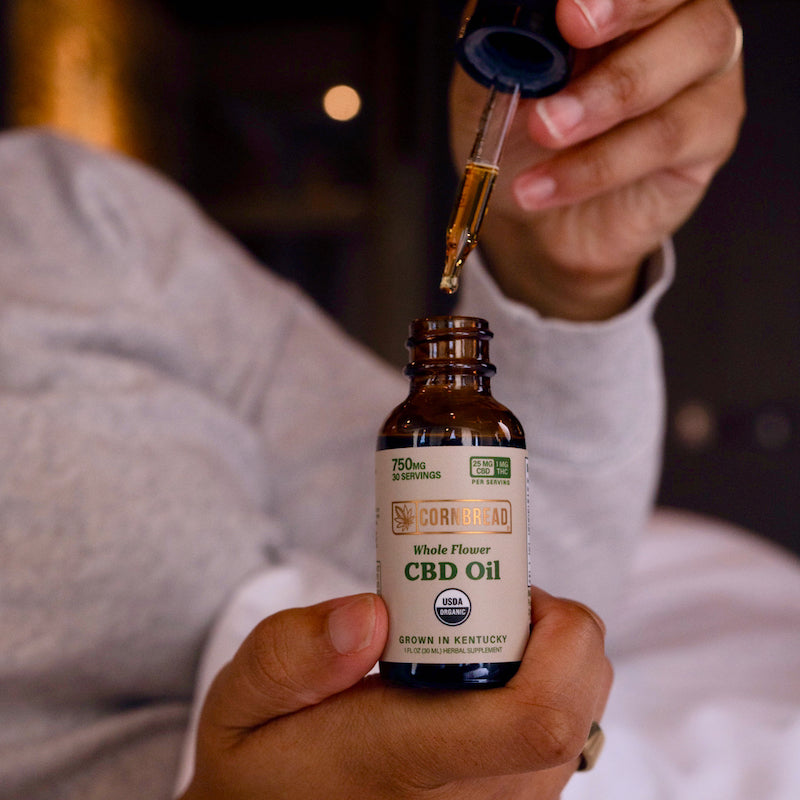
No matter what kind of CBD you choose to take, it's important to select a high-quality product that will actually produce the effects you're looking for. As mentioned earlier, not all CBD products are created equal. Because this market is largely unregulated, many brands on the market do very little to maintain the quality of their products.7 When shopping for your next CBD supplement, be sure to look for products with the following features.
-
USDA Certified Organic
Hemp is a "bioaccumulator," which means it absorbs heavy metals, pesticides, and other harmful contaminants from the soil, and it does this at a faster rate than it can release them.
CBD made from tarnished hemp will contain those same contaminants, which can cause an array of problems for anyone consuming it.
You can avoid the risks associated with these toxins by only purchasing CBD supplements that are certified organic by the USDA. The USDA has strict guidelines for organic farming and processing, so look for the USDA organic seal to know that you're getting a high-quality CBD product that was responsibly sourced and is safe to consume. -
Third Party Tested
Reputable cannabinoid companies utilize third party lab tests to verify the exact cannabinoid content of their products. These tests also detect any harmful contaminants or toxins and report on their levels (if present). You should be able to find the results of a product's lab test in the form of a Certificate of Analysis (COA), typically available on a company's website.
If you can’t view the third party test results before making your purchase, then find another product with a COA. -
Full Spectrum CBD (CBD With Some THC)
Look for a full spectrum CBD supplement that contains a variety of cannabis compounds, as well as THC (up to 0.3%). This will allow you to experience the entourage effect and get the most out of your CBD. -
Sold By a Reputable Company
Unfortunately, some brands falsely market hemp seed oil (which doesn't contain cannabinoids) as CBD oil. You can avoid these sham products by purchasing from reputable companies after reviewing the results of their third party lab tests and confirming the actual cannabinoid content.
Full Spectrum CBD From Cornbread Hemp
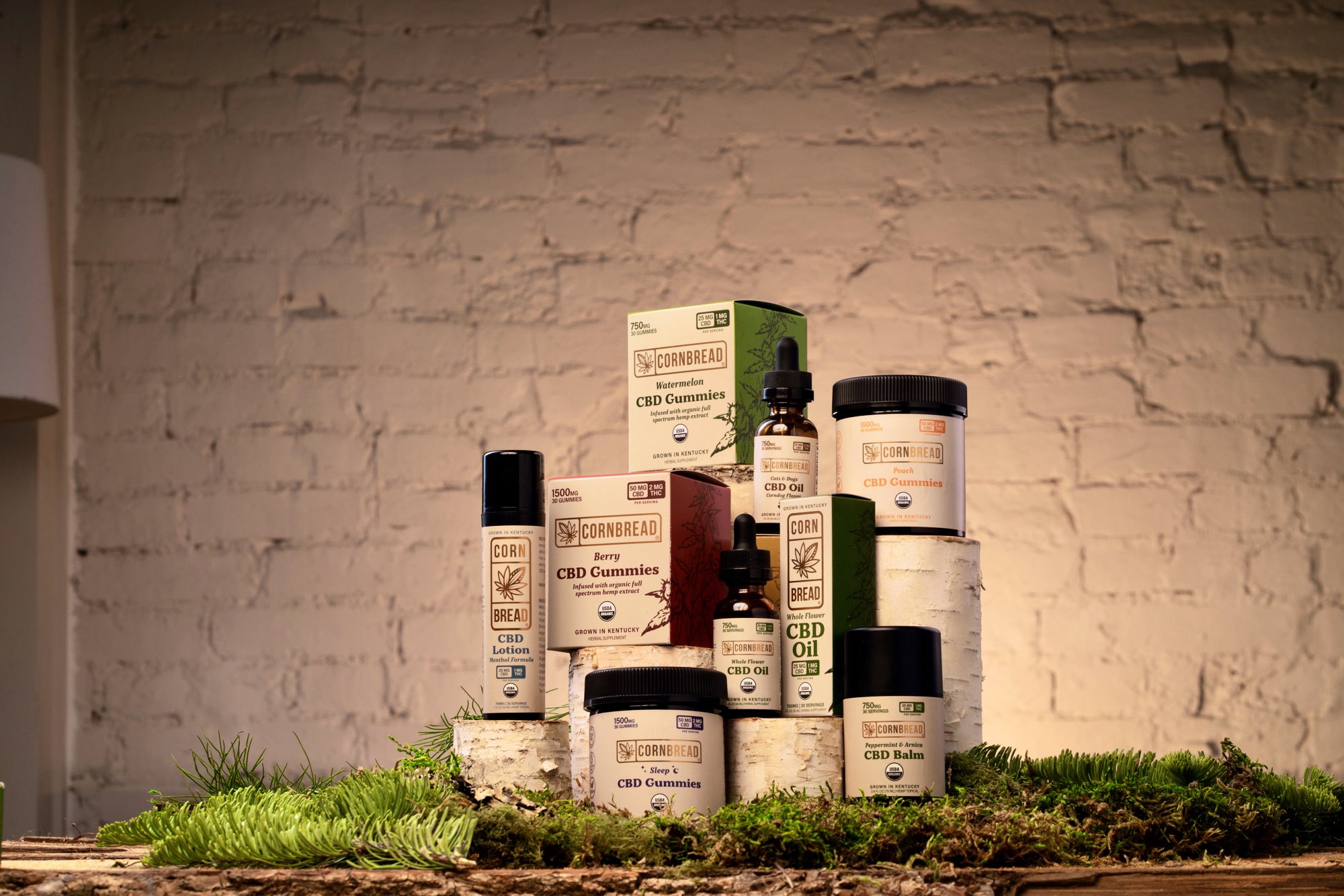
At Cornbread Hemp we get that our customers are looking for natural solutions that make a difference. That's why we offer Full Spectrum CBD oil that's USDA certified organic, and is made with our Flower-OnlyTM hemp extract. Our CBD oil contains both CBD and THC in one of the strongest ratios available while still being within the federal legal limit.
We offer a variety of CBD supplements, all made with the highest quality CBD. Visit our online store to shop our complete line of full spectrum CBD supplements.


